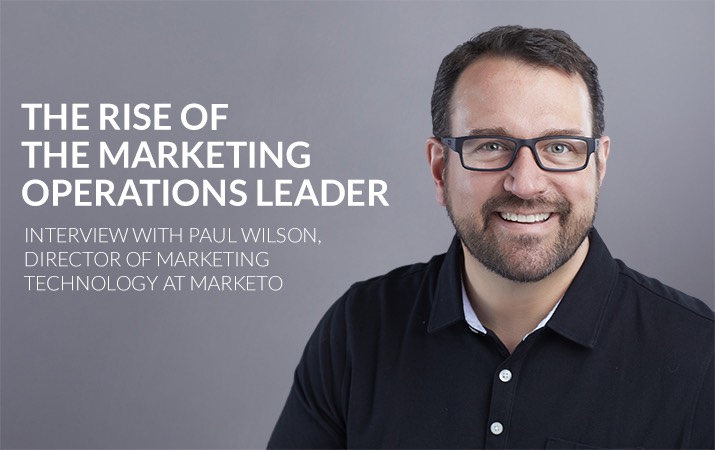
Oct 11 2018 The Rise of the Marketing Operations Leader – Interview with Paul Wilson, Director of Marketing Technology at Marketo, an Adobe company
The rise of marketing operations is taking the MarTech industry by storm. Managers are stepping into new roles, leading both strategic and technical marketers alike to achieve results.
What can a new marketing operations leader expect out of this role? How can she be prepared?
To get the answer we turned to the Community of experts and are excited to share our interview Paul Wilson, Director of Marketing Technology at Marketo. Paul shares his insights on how marketing operations leaders can excel in this new age.
Romanoff: How do you think marketing operations leaders should think about growth? How can they get their team to talk about growth?
Paul: When I hear growth my thoughts go immediately to scale and breadth. Marketing operations leaders have to see growth in those two dimensions. To scale, how do we build an infrastructure that supports the needs of additional marketers as well as additional audience members? To support a greater breadth of marketing – how do we ensure the infrastructure is ready for new technologies, new sources of data, and how do we leverage that data to do better marketing?
In terms of the team, I believe that marketing operations team members are on the front lines to protect growth. A team that is disciplined to not build band aid fixes ensures there is less technical debt and cleaner data. Simple practices like enforcing standard naming conventions, archiving legacy programs, and regular data quality audits go a long way to prepare for growth.
Romanoff: What advice would you give a new marketing operations leader?
Paul: Marketing operations as a discipline is morphing rapidly as sales and marketing alignment proves there is just one revenue funnel. In many organizations, the technology that once was only leveraged by marketing now encompasses the entire lifecycle of a customer, making the marketing operations team of yesterday the end-to-end customer experience team of tomorrow. As a leader in this discipline you need to look beyond technology and see your role as a solution architect, knowledgeable about the four layers that encompass a complete solution.
Process Level – The business process being supported, such as “requesting a free trial”.
Data Level – the minimum data model required to complete the business process, this may include “person data on the requester, the product they are trialing, and the validity dates of the trial”.
Human Level – Who are the stakeholders in the business process? Roles like “the lead, the BDR, and the marketing team”.
Technology Level – Which technologies are leveraged to support the users, the data, and the process? Leaders build for all four layers while novices can only see a solution from the technology layer and attempt to always build up from there.
Romanoff: What advice would you give someone looking to grow from marketing operations leader to leading all of marketing?
Paul: I see marketing and marketing operations as being different disciplines. Marketing operations is morphing into a broader ecosystem of people, processes, and technologies on which customer experience is based. The discipline of marketing is about attracting good prospects to your brand, engaging with them where they are (and how they want to be engaged with), and accelerating their speed to becoming a customer.
I have explained this before using the kitchen of a restaurant as an analogy. There are people who plan the best operational layout of a kitchen for the volume of customers expected to come through the restaurant. They need to select the proper equipment, prep gear, cookware and plan where the electrical, plumbing, and gas hook ups need to be to support workflows. They are not the chefs who know how to execute the menu of the restaurant and deliver phenomenal meals to guests in reasonable time. They fully understand the process and requirements, but have other skills. If you are looking for opportunities beyond marketing operations, I would suggest looking for a broader role -starting by aligning with sales operations to define a revenue operations team!
Romanoff: How should a marketing operations leader think about proving their worth, perhaps, using marketing attribution to measure effectiveness? What advice would you tell a marketing operations leader who wants to get attribution right?
Paul: There are many attribution models: selecting the most appropriate one and defining the weights of different program types will take time so manage expectations. Once you have selected a model, it is important to enforce a structure that consistently supports it. Having to tweak and clean up data every month to get accurate reporting is a hassle you can protect against.
For the ops leader wanting to get attribution right I would caution against a drive for perfection: Attribution is not a science, rather an approximation. The real answer to the question “what made them buy our offering?” has more to do with human factors than attribution formulae. Your model is informative on what programs they engaged with, but the real factors are much more complex.
